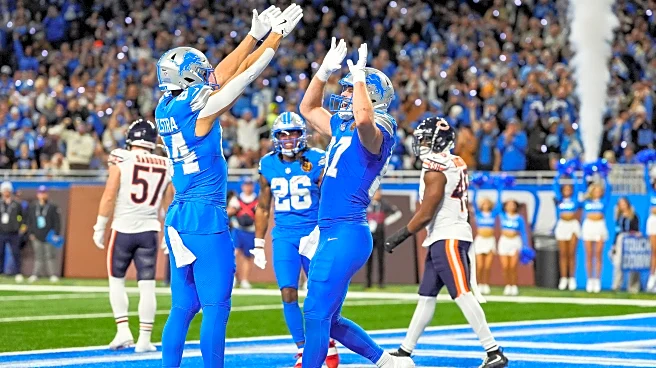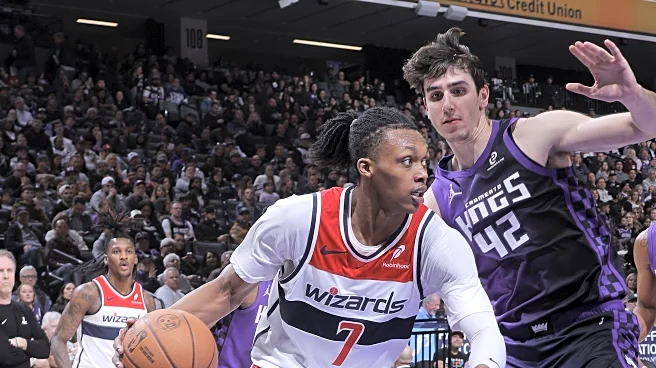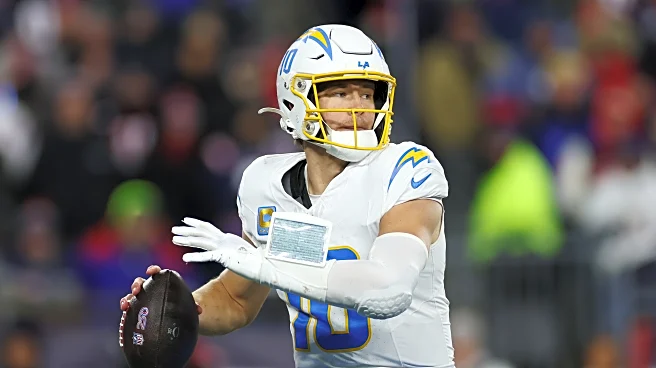Our On Paper previews have a tough job early in the season. For an analysis piece that relies so heavily on data, the first few weeks of the season deal with incredibly small sample sizes and last year’s
outdated metrics.
For the Detroit Lions and Chicago Bears, last year’s data may not mean much. The Bears have a completely new coaching staff and new offensive and defensive schemes that they brought with them. The Lions may be holding onto the same schemes, but with two new coordinators, it may not look exactly the same.
So while this week’s On Paper preview between the Lions and Bears will have the same charts you’re used to seeing, I will not be relying on that data much. Instead, there will be a heavier emphasis on Week 1 performances, with the acknowledgement that those small samples sizes shouldn’t be over-analyzed, either.
Here is my Lions vs. Bears preview and prediction.
Note: Because of the uniqueness of this matchup, I will be using DVOA numbers from 2025 only. These numbers have not been opponent adjusted yet.
Lions pass offense (28th) vs. Bears pass defense (13th)

It wasn’t a very great start for the Lions’ pass offense, which finished 2024 sixth in DVOA. In Week 1, the Lions pass offense ranked:
- 21st in yards per attempt (5.8)
- 18th in passer rating (88.6)
- 18th in dropback EPA (0.045)
- 16th in success rate (47.7%)
So the offense dropped from an arguably top-five unit to an extremely average passing attack. The question is: why?
“Thursday Night Football” provided part of the answer: the Packers defense. Jayden Daniels, who in Week 1 completed 63.3% of his passes for 7.8 yards per attempt and a 98.3 passer rating, saw all of those numbers plummet vs. the Packers: 57.1 completion %, 4.8 yards per attempt, 85.4 passer rating. By most metrics, the Lions’ passing attack was actually more efficient that Washington’s. In fact, the advanced metrics were way better for Detroit: the Commanders’ dropback EPA was -0.133 (vs. Lions’ 0.045) and their success rate was 38.9 (vs. 47.7%).
That’s the good news.
The bad news is the Lions offensive line. The Packers’ defensive front gave the Lions fits throughout Week 1, and while the damage may not be as bad as you think, 19 pressure allowed (per PFF) is certainly not a good day.

Last year, the Bears had a strong pass defense (13th in DOVA) that seemed to fall apart a bit by the end of the season.
Despite a drastic change in scheme, Chicago is off to a decent start again in 2025, which speaks to their strong personnel. Despite missing three key defenders last week, the Bears managed to rank:
- 21st in yards per attempt (7.2)
- 21st in passer rating (98.5)
- Sixth in dropback EPA (-0.150)
- 19th in success rate (48.1%)
Okay, maybe that’s not as rosy as I made it out to be, but Chicago’s pass defense was dominant through three quarters, then collapsed completely in the fourth. I can’t discount the fourth quarter completely, but here’s what J.J. McCarthy’s stats look like after three quarters:
7-for-12, 56 yards, 1 INT, 35.4 passer rating
Then this happened in the fourth quarter: 6-of-8, 87 yards, 2 TDs, 149.5 passer rating
I don’t know what to make of that from the Bears point of view, but I tend to think this is an above-average unit based on history, personnel, and how most of Monday went. And with at least T.J. Edwards and star cornerback Jaylon Johnson back from injury, they should be a firm test for the Lions.
Player to watch: Bears DT Gervon Dexter. I didn’t talk much about the Bears pass rush, which actually ranked 32nd in win rate (per ESPN) and 23rd by PFF grade. But Dexter is an intriguing interior disrupter who is still seeking his breakout season. He had a sack last week and a sack in his one 2024 matchup against Detroit.
Advantage: Lions +1. Maybe I’m being naive here, but I think against a man-coverage defense, the Lions passing attack should fare much better. The Packers defense is legit and it was a problem for Detroit last year, too. And while I think the Bears personnel is very good, they’re still adjusting to a scheme that is very familiar to the Lions, and I think we should see a rebound from Detroit.
Lions run offense (28th) vs. Bears run defense (22nd)

Last week’s rushing game was one of the worst performances in the Dan Campbell era. I’ll let our own Al Karsten highlight that with a single tweet:
All week, the Lions have insisted this performance was extremely fixable, and the biggest culprit—communication errors—have already been fixed and streamlined. Is it realistic to believe that the Lions running game can flip a switch and suddenly become the dominant unit it has been for the past few years? Probably not.
Although, again, we have to give some credit to the Packers defense. On Thursday, they held the Commanders to just 51 rushing yards on 19 carries—a 2.7 yards per carry average. Against the Giants, Washington had the second-best rushing performance of Week 1: 220 yards and 6.9 yards per carry. So… maybe the inverse happens to the Lions?
I have some serious doubts, but this week does provide a decent opportunity to turn things around, because…

The Bears run defense was putrid last year, ranking 31st in DVOA.
Early on Monday, it had looked like they had figured some things out. Again, through three quarters vs. the Vikings, everything was running smoothly. Minnesota had just 38 yards rushing on 13 carries (2.9 YPC). Then they hemorrhaged 82 rushing yards on 13 carries (6.3 YPC) in the fourth quarter alone.
Where does the real Bears run defense lie? It’s impossible to know this early in the season, which makes this a very difficult matchup to analyze.
Player to watch: T.J. Edwards. With the Bears linebacker expected to return from injury this week, it could bolster this unit. Last year, Edwards led Chicago with 12 tackles for loss.
Advantage: Lions +0.5. I really want to believe the Lions have magically fixed all of the offensive line issues, but there was just far too much bad for me to wholeheartedly believe it. Still, I’m clinging onto the hope of the Commanders’ example and last year’s terrible Bears defense as a reason Detroit could turn it around this week. But confidence is still low.
Bears pass offense (23rd) vs. Lions pass defense (29th)

Well, the Ben Johnson era of Caleb Williams’ career looks… well, not too different from his rookie season so far. After a hot 10-for-10 start—that included a high percentage of checkdowns—Williams fell back to reality and finished Week 1:
- 20th in yards per attempt (6.0)
- 21st in passer rating (86.6)
- 21st in dropback EPA (0.013)
- 15th in success rate (47.8%)
It’s a step in the right direction for a passing offense that finished 26th in DVOA last year, but anyone who was hoping for a magic Week 1 turnaround was always asking too much. Of course, it’s important to consider Chicago’s opponent, too. The Vikings defense has always been very hard to diagnose, particularly for a young quarterback like Williams. So some early struggles are expected.
It wasn’t just Williams struggling against the Vikings defense, the Bears offensive line had issues identifying Brian Flores’ disguised pressure packages. Chicago ceded 30(!!) pressures against the Vikings, per PFF. The biggest culprits were left tackle Braxton Jones (6 pressures allowed), right guard Jonah Jackson (5), left guard Joe Thuney (4), and center Drew Dalman (4). So… pretty much everyone but right tackle Darnell Wright (0 pressures allowed.
So, theoretically speaking, if you have an elite pass rusher, you may want to put him everywhere but over the right tackle.

The Lions weren’t exactly gashed through the air against the Packers, allowing just 188 yards. However, Jordan Love only attempted 22 passes in that game. Had Green Bay needed to be more aggressive in the second half, it could’ve looked worse. By efficiency metrics, it wasn’t a great day for the Lions pass defense:
- 26th in yards per attempt (8.5)
- 29th in passer rating allowed (18.6)
- 31st in dropback EPA (0.474)
- 7th in success rate (41.7%)
That last metric is what could bring hope. It suggests that while the Lions overall metrics look bad, on a play-by-play basis, they were okay. In other words, they gave up too many big plays that skewed the numbers. The Lions allowed three passing plays of 20 or more yards.
And that’s exactly what defensive coordinator Kelvin Sheppard said this week, as well.
“47 snaps, take away those three plays, and you guys tell me would y’all have liked that as Lions fans as a defensive performance?” Sheppard said. “But you cannot play that game, you cannot take plays out. That’s why each play is that important and that critical that we detail and do your job each and every play.”
But part of the reason the Packers were able to connect on those deep shots was the Lions’ lack of pass rush. In Week 1, they ranked 26th in ESPN’s pass rush win rate and 19th in PFF’s pass rush grade. Detroit’s defensive line failed in creating pressure (only Aidan Hutchinson had more than one), and perhaps more disappointingly, the Lions blitzing defenders were completely inept. Brian Branch, Jack Campbell, and Alex Anzalone combined for zero pressures on 12 pass rushing attempts.
Player to watch: Bears WR Olamide Zaccheaus. While DJ Moore, Rome Odunze, Cole Kmet, and rookies Colston Loveland and Luther Burden are all talented, Zaccheaus seems to have emerged as one of Williams’ favorite targets. He saw seven targets last week and turned it into four catches for 42 yards. Playing mostly in the slot, expect Amik Robertson to be lined up against him, when the Lions go into nickel packages.
Advantage: Draw. I still have faith in Detroit’s secondary, but I am largely concerned about their pass rush, and I am less confident in the secondary when they have to cover for a long amount of time. Chicago’s offensive line is a work in progress, but I’m willing to bet they’ll be better this week than they were last week. So, I don’t really have a strong feeling about how this one could go. I can see it tipping in either direction.
Bears run offense (6th) vs. Lions run defense (11th)

Chicago ranked 25th in rushing DVOA last year, and I’m not so sure it’ll be much better this year. Don’t let the DVOA ranking fool you, that is largely influenced by Caleb Williams’ six rushes for 58 yards and a touchdown—none of which were designed runs. If you look at advanced metrics that do not count scrambles as part of the run game, here’s how the Bears fared in Week 1:
- 26th in EPA (-0.249)
- 32nd in success rate (19.0%)
D’Andre Swift managed just 53 rushing on 17 carries (3.1 YPC), and he’s under fire again for poor vision.
But let’s back up to those scrambles, because we can’t just throw them out. Williams was dynamic on Monday at escaping pressure and turning it into positive plays. The Lions defense hasn’t exactly been great at preventing mobile quarterbacks from popping off. Although last year, Williams rushed for 39 and 34 yards in his two matchups against the Lions.
Still, it seems like Ben Johnson is giving Williams a little more freedom to utilize those legs when appropriate, and the Lions will have to be ready.

Finally we come to the unit I have the most confidence in. The Lions run defense has been excellent for a few years running, and last week’s shut down of Josh Jacobs (who fared much better vs. WAS, by the way) is a sign the Lions should be just fine defending the run in 2025.
Admittedly, the advanced stats aren’t as kind to Detroit. They ranked 22nd in rush EPA and 26th in success rate. However, I attribute some of that to late-game struggles after the defense had been worn down. Early in the game, with it still competitive, the Lions allowed just 11 yards rushing on seven carries in the first half.
Player to watch: Williams. The only thing that could tip this matchup in Chicago’s favor is if Caleb Williams goes off. It’s certainly possible, but the Lions are well aware of that threat, and their “crush the pocket” style of pass rushing should actually help them, as long as everyone has gap discipline.
Advantage: Lions +1.5. This is the matchup I have the most confidence in, even if Williams’ mobility scares me. Detroit should dominate the trenches here, and I wouldn’t expect much of a day from Swift.
Last week’s prediction
Week 1 is hard, guys. My prediction of 24-17 Lions was pretty far off, but in my defense, I listed three things that could go wrong and flip things in Green Bay’s favor:
- If the Lions OL struggles with chemistry and they can’t run the football, it would force Detroit into third-and-longs, giving Parsons the opportunity to tee off
- The Packers connect on a few game-changing explosive plays through the air
- Green Bay is able to run the ball with Josh Jacobs
Well, those first two happened, and those were the exact reasons Detroit lost.
Obviously, I have adjusted expectations with the Lions offensive line.
In the comment section, we really only had two pessimists who came close, and I’ll just give them both credit for the “win.” Hankfan232425 predicted 27-20 Packers and JayBDet predicted 31-21 Packers. Here is your prize:

It’s a banner you can put on the entrance of any stadium, just in case you want to fool someone into showing up to a field and maybe playing a game of football or 16.
This week’s prediction
I have the Lions with a +3 advantage, which is fairly significant. Like last week, I’ll provide some caveats on how things could flip in the other direction.
- If the Jared Goff turns the ball over to Chicago’s talent back-seven
- If Caleb Williams has too much time to throw, and torches the Lions’ secondary (he had a combined 590 yards vs. Lions last year)
- If the Lions don’t contain Williams as a rusher
Again, all of these things are very possible, and they’re the biggest keys for Detroit to avoid. Number 2 may concern me the most.
But the talent is just too lopsided in this matchup, in my opinion. Lions 27, Bears 17.











